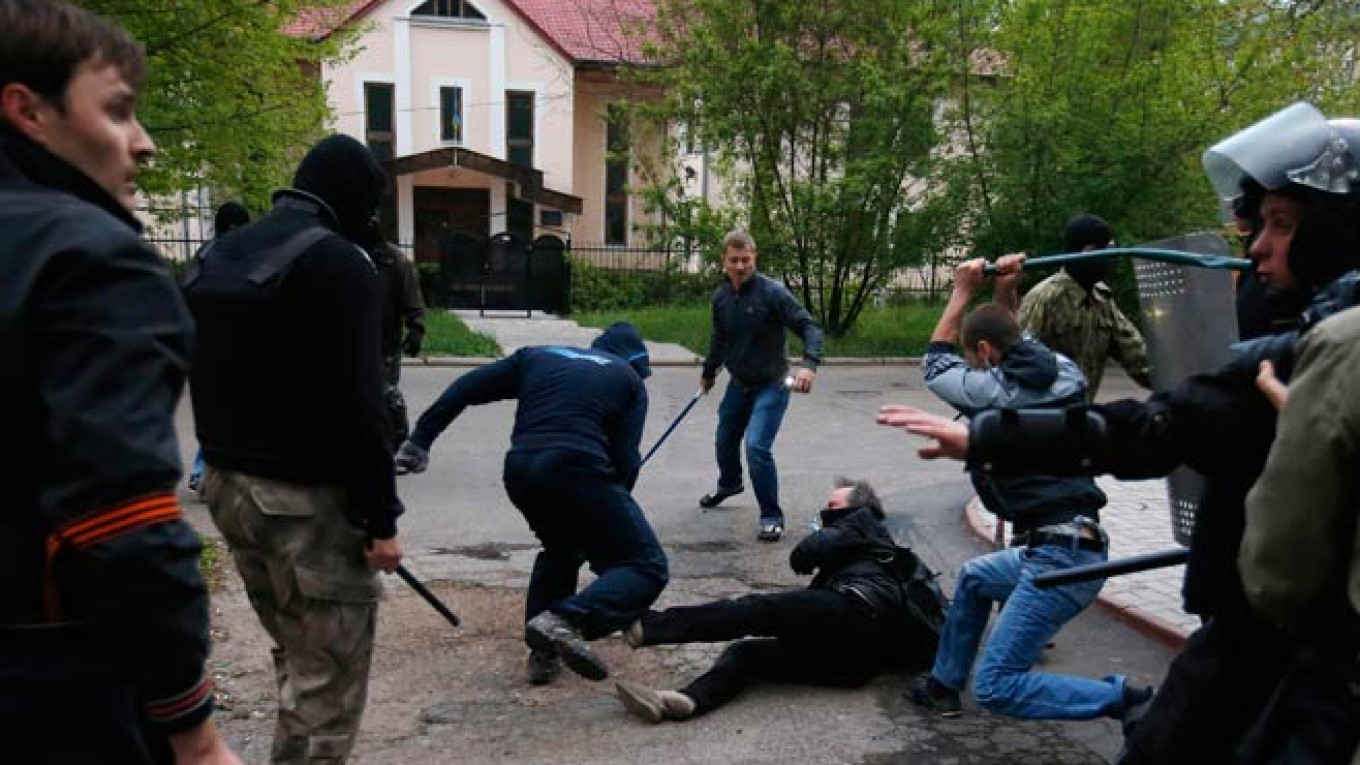KIEV — The mayor of Ukraine's second-largest city was shot in the back and pro-Russia insurgents seized more government buildings Monday as the U.S. hit Russia with more sanctions for allegedly fomenting the unrest in eastern Ukraine.
One presidential candidate said the mayor was deliberately shot in an effort to destabilize the entire city of Kharkiv.
Armed insurgents tacitly backed by Moscow are seeking more autonomy in the region — possibly even independence or annexation by Russia. Ukraine's acting government and the West have accused Russia of orchestrating the unrest, which they fear Moscow could use as a pretext for an invasion.
Ratcheting up the pressure on President Vladimir Putin, President Barack Obama's government levied new sanctions Monday (see story, page 1).
Hennady Kernes, the mayor of Kharkiv, was shot in the back Monday morning while cycling on the outskirts of the city and underwent surgery, City Hall said. He was reported by the hospital to be in "grave, but stable" condition.
Officials have not commented on who could be behind the attack, but Kernes was a man who could have angered both sides.
Kernes' friend and former Kharkiv governor, Mykhailo Dobkin, told journalists the attackers were aiming at Kernes' heart and wanted to kill him in an effort to destabilize the city of 1.5 million. Dobkin is among several candidates running in Ukraine's May 25 presidential election.
"If you want to know my opinion, they were shooting not at Kernes, but at Kharkiv," he said.
Kernes was a staunch opponent of the pro-West Maidan movement that toppled President Viktor Yanukovych in February and was widely viewed as the organizer who sent activists to Kiev from eastern Ukraine to harass those demonstrators.
But he has softened his stance toward the new Kiev government. At a meeting of eastern Ukrainian leaders and acting Prime Minister Arseniy Yatsenyuk this month, Kernes insisted he does not support the pro-Russia insurgents and backed a united Ukraine.
Kharkiv is in eastern Ukraine, where pro-Russia gunmen have seized government buildings and police stations, set up roadblocks and staged protests to demand greater autonomy or even annexation by Russia. But unlike the neighboring Donetsk region, Kharkiv has been largely unaffected by the insurgency and Kernes has been credited for this. Its administration building was briefly seized earlier this month but promptly cleared of pro-Russia protesters.
The Russian Foreign Ministry said the attack on Kernes, along with other events, "indicates that it is not possible to speak of any 'peaceful' pre-election campaign in Ukraine."
On Monday, pro-Russia militants wearing masks gained another foothold in east Ukraine, seizing a city hall building and police station in the city of Kostyantynivka, 160 kilometers from the Russian border. The city is 35 kilometers south of Slovyansk, a major city that has been in the hands of insurgents for more than three weeks.
After the seizure, about 15 armed men guarded the City Hall building. Some posed for pictures with residents while others distributed St. George's ribbons, the symbol of the pro-Russia movement.
Moscow has repeatedly pushed for a referendum on federal autonomy in Ukraine, but Kiev and its Western allies have refused, accusing Russia of fomenting separatist sentiment in an attempt to foil the May presidential vote.
However, Justice Minister Petro Petrenko said the parliament in Kiev would debate the idea of a referendum on Tuesday, Interfax reported.
A Message from The Moscow Times:
Dear readers,
We are facing unprecedented challenges. Russia's Prosecutor General's Office has designated The Moscow Times as an "undesirable" organization, criminalizing our work and putting our staff at risk of prosecution. This follows our earlier unjust labeling as a "foreign agent."
These actions are direct attempts to silence independent journalism in Russia. The authorities claim our work "discredits the decisions of the Russian leadership." We see things differently: we strive to provide accurate, unbiased reporting on Russia.
We, the journalists of The Moscow Times, refuse to be silenced. But to continue our work, we need your help.
Your support, no matter how small, makes a world of difference. If you can, please support us monthly starting from just $2. It's quick to set up, and every contribution makes a significant impact.
By supporting The Moscow Times, you're defending open, independent journalism in the face of repression. Thank you for standing with us.
Remind me later.


